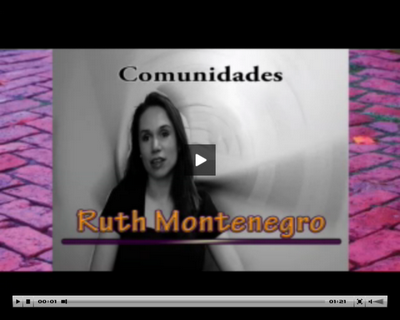Fun Activity about Current Events for Spanish Community Service Learning
 |
| Students watched this interview with a Guatemalan businesswoman. (On left, choose "Videos" then scroll down to Unit 3 videos. |
When students do Spanish community service learning (CSL), they can get a myopic view of Latinos in the US. They form close relationships with the individuals with whom they work, but it's necessary to always bring them back around to the larger context. Today, in "Spanish in the Community" we did that in several ways.
1. Share. In pairs, students had five full minutes to simply share about their work in the community: what they have done lately, how it is different than at the beginning of the semester, what their goals are for the rest of the semester, etc.
2. Become informed. We did part of Lección 15 from Comunidades: Más allá del aula--¿Son noticias para nosotros? (pages 98-101). For a fun get-up-and-move-around activity (p. 100), I did the following:
- Print several different articles from today's edition of La Raza (a Spanish-language newspaper from Chicago). If you have 20 students, you need 10 articles; 30 students, 15 articles; etc.
- Cut each article in half and mix the pieces up thoroughly.
- Hand each student one "half" of an article.
- Tell all students to stand up, talk to one student at a time and find their "other half."
- Tell students to sit down with their other half and summarize the halves to each other so that they have the full story.
- Have students write a few sentences connecting the information from the news story to what they have learned in the course, in the community and/or in the classroom.
Students had fun finding each other, and it really helps to give variety to the format of the class.
3. Expand our notions of Latina/o immigrants. I reminded students that when we do Spanish CSL, we are working with Latino immigrants who are receiving a service from our community partner organization--after-school tutoring, counseling, nutrition training, etc. However, we must always remember the diversity among Latinos:
- not all Latinos are immigrants
- certainly not all Latino immigrants are undocumented
- not all Latinos (immigrants or not) are service recipients
To illustrate this, we watched a video interview from Comunidades. In it, Ruth Montenegro, originally from Guatemala, talks about her work in quality control within a US company. (The videos that accompany Comunidades are free, just click on the link and look for this one within the Unit 3 videos.)
4. Examine our notions of success. Ruth Montenegro is obviously a very successful businesswoman. But it is important for us to consider that our ideas about success are determined by our cultural perspectives. Students did the activity on pages 94 and 95 in Comunidades that gives them several scenarios and asks them if they consider them to be "successes" or not. This is always a very interesting activity. Given the examples, you can see that our notions of success are gendered and are often individualistic and primarily about economic/material success. Other cultures may favor a more social and group-centered idea of success. When we start our next class period, I will ask students to answer these questions (maybe on video):
- What would success look like for you in your CSL work?
- How would you know if your work was successful or not?
The louder the Spanish class, the better!
Today's class worked substantially on all four skills: listening, speaking, reading and writing. It also hit on all 5 Cs: communication, cultures, comparisons, connections and communities. Which activity worked on Comparisons? Which activity focused on listening comprehension? Speaking of success: would you define this as a successful lesson plan? What constitutes a successful lesson plan? As always, please feel free to use any of these idea with your students and leave your suggestions and comments here.



Comments
Post a Comment